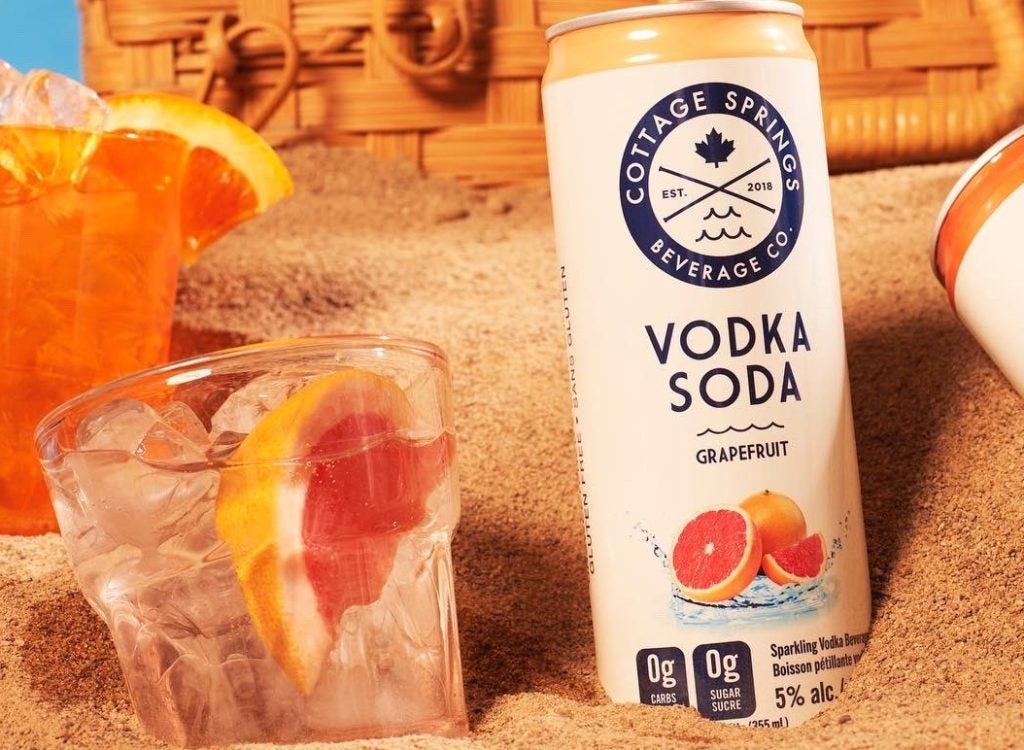Each week, Just Drinks’ editors select a deal that illustrates the themes driving change in our sector. The deal may not always be the largest in value, or the highest profile, but it will tells us where the leading companies are focusing their efforts, and why.
This new, thematic deal coverage is driven by our underlying disruptor data which tracks all major deals across our sectors.
The deal
Corby Spirit and Wine, Pernod Ricard’s majority-owned Canadian business, has acquired a 90% stake in Canadian RTD producer Ace Beverage Group.
Ontario-based Ace Beverage Group (ABG) was created in 2020 when Cottage Springs and Ace Hill merged, making the company one of Canada’s largest independent RTD producers. Its range includes Cottage Springs vodka soda.
Why it matters
Though the deal was struck through Corby Spirit and Wine, the transaction should of course be viewed through the lens of Pernod Ricard’s strategic objectives.
There are two principal dynamics at play: Pernod Ricard’s presence in North America and the growth prospects of the RTD market.
In recent years, the Jameson whiskey owner has faced questions from the investment community about the growth profile of its business in North America. Amid the growth in Tequila and in US whiskey, some analysts, weighing up Pernod’s own portfolio, have pressed the company on its plans for one of the world’s key spirits markets.
The company itself acknowledged its efforts to outpace the market was akin to turning around a big ship and, under captain Alexandre Ricard, the group has sought to make up the leeway. In the second half of last year, Pernod announced a trio of deals Just Drinks spirits commentator Richard Woodard described as a significant shift for the business in North America.
And the deal for Ace Beverage Group (ABG) is being seen as another move to improve the profile of Pernod’s business in the region.
“Pernod Ricard is trying to change its North American portfolio towards more growth categories because it’s probably underperformed the overall spirits market in the last couple of years,” Richard Withagen, an analyst covering the Absolut owner for European financial services group Kepler Chevreux, says. “If you listen to conference calls, there’s always questions about the US: ‘are you holding share? Are you losing share?’ It’s been going on for a couple of years.”
Pernod’s hat-trick of North American deals in the second half of 2022 centred on spirits and sparkling wine but it’s been clear RTDs has been another segment in which the company has wanted to expand. In November, the group revealed investment at an RTD production facility in the US.
Speaking to Just Drinks this week, a senior Pernod executive said the ABG deal boosted the company’s RTD business in Canada, the third-biggest market for the drinks globally. “This category is a little bit different to spirits in that you need scale,” Fredrik Syrén, global managing director of Pernod’s RTD and convenience business, said.
For now, Pernod’s focus is to further expand ABG’s existing business in Canada before considering any moves outside that market, though it doesn’t take a huge leap of imagination to see the opportunities in the US.
And Pernod’s aspirations in RTDs are clear. Syrén says the company has an “ambition to build a global RTD business and capture our fair share”.
David Harris, research director for alcoholic beverages at GlobalData, Just Drinks’ parent, suggests the purchase of ABG, the company behind the Cottage Springs brand, could spark further acquisitions – if the deal pays off.
“If they win with Cottage Springs expect to see a big push and possibly more acquisitions, if it fails to grow, then they’ll view this as simply growing their RTD portfolio,” Harris says.
There is, however, some debate about the overall growth prospects for RTDs in North America.
Kepler Chevreux’s Withagen is optimistic. “Overall, this RTD trend is in line with macro consumer trends in terms of convenience. Probably in terms of health, you can make an argument for RTDs as well but certainly on the convenience side, I think that will probably continue,” he says. “RTDs can still continue to grow, certainly in the US. Maybe in Canada, we’re in a probably slightly more mature phase, given it’s already quite a sizeable category in that market but there’s still growth.”
However, Phil Gorham, a drinks industry analyst for US financial services group Morningstar, is more circumspect. While positive about the opportunities the acquisition presents for product development, he is less certain about the RTD category’s trajectory.
“Pernod’s portfolio is quite a good fit I think for these products. Vodka is the obvious one, and this could help create a new category of Absolut RTD brands, for example. In gin, Beefeater and Malfy could also do well in RTD,” Gorham says. “I don’t know why they need an acquisition to do that – it’s not as if they need the distribution – but maybe some category expertise will help.”
Nevertheless, he adds: “I am not convinced that the RTD market size will grow to be much bigger. These drinks could possibly sit on the menu at a restaurant and make the bar service more efficient and I can see some appeal in the off-trade but some people are going to want different strengths – i.e. stronger – than the ready-made ratios and it won’t fit well in higher-end bars where the bartender is more prominent. It may act as a useful gateway to spirits from beer and wine though, which is definitely a long-term growth driver.”
The details
The deal, struck for C$185.5m ($111m), includes an option for Corby to fully acquire the RTD manufacturer through a series of call options on the remaining shares that can be enacted in 2025 and 2028.
Corby has indicated it will use available cash and financing in the amount of C$120m from Pernod Ricard to complete the deal.
More research:









